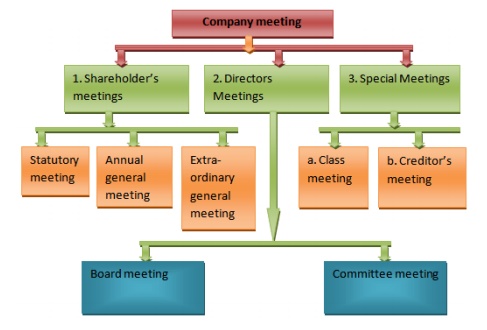Chapter: 12th Commerce : Chapter 28 : Company Law and Secretarial Practice : Company Secretary
Kinds of Company Meetings
Kinds of Company Meetings
Under the Companies Act, 2013,
Company meetings can be classified as under:
1. Meetings of Shareholders:
(a) Statutory Meeting
(b) Annual General Meetings (AGM)
(c) Extraordinary General Meetings (EGM)
2. Meetings of the Directors
(a) Board meetings
(b) Committees meetings
3. Special Meetings
(a) Class Meetings.
(b) Creditors and of Debenture/bond holders
meetings
The following picture shows the different types of
company meetings

01. Shareholders Meetings
The meeting held with the shareholders of the
company is called shareholders meeting. The shareholders meeting can be
classified as statutory meeting, annual general meeting and extra ordinary
general meeting
a) Statutory Meeting
According to Companies Act, every public company,
should hold a meeting of the shareholders within 6 months but not earlier than
one month from the date of commencement of business of the company. This is the
first general meeting of the public company is called the Statutory Meeting.
This meeting is conducted only once in the lifetime
of the company. A private company or a public company having no share capital
need not conduct a statutory meeting. The company gives the circular to
shareholders before 21 days of the meeting.
b) Annual General Meeting [AGM]
Every year a meeting is held to transact the
ordinary business of the company. Such meeting is called Annual General Meeting
of the company (AGM). Company is bound to invite the first general meeting
within eighteen months from the date of its registration. Then the general
meeting will be held once in every year. The differences between two general
meetings should not be more than fifteen months. Every Annual General meeting shall
be held during business hours, on a day which is not a public holiday, at the Registered Office of the
company or at some other place within the town or village where the Registered
Office is situated. AGM should be conducted by both private and public Ltd
companies.
c) Extra-Ordinary General Meeting
Both Statutory meeting and annual general meetings
are called as ordinary meetings of a company. All other general meetings other
than statutory and annual general meetings are called extraordinary general
meetings. If any meeting conducted in between two annual general meeting to
deal with some urgent or special or extraordinary nature of business is called
as extra-ordinary general meetings.
02. Meeting of the Directors
Since the administration of the company lies in the
hands of the board of directors, they should meet frequently for the proper
conduct of the business and to decide policy matters of the company.
a) Board Meetings
Meetings of directors are called Board Meetings.
Meetings of the directors provide a platform to discuss the business and take
formal decisions. First meeting of directors should be convened within 30
(Thirty) days from the date of incorporation of the company.
b) Committee Meetings
Every listed company and every other public company
having paid up share capital of ₹10 crore is required to have audit committee.
This committee should meet at least four times in a year. In case of other
companies, the board of directors shall nominate a director to play the role of
audit committee which is functioning as a vigil mechanism.
03. Special Meeting
a) Class Meeting (Meetings of Particular Share or Debenture Holders)
Meetings, which are held by a particular class of
share or debenture holders e.g. preference shareholders or debenture holders is
known as class meeting. The debenture holders of a particular class conduct
these meetings. These meetings are held according to the rules and regulations
laid by the Trust Deed or Debenture Bond, from time to time, where the
interests of the debenture holders play vital role at the time of
re-organisation, reconstruction, amalgamation or winding-up of the company.
b) Meetings of the Creditors
Strictly speaking, these are not meetings of a
company. Unlike the meetings of a company, there arise situation in which a
company may wish to arrive at a consensuses with the creditors to avoid any
crisis or to evolve compromise or to introduce any new proposals.
Related Topics